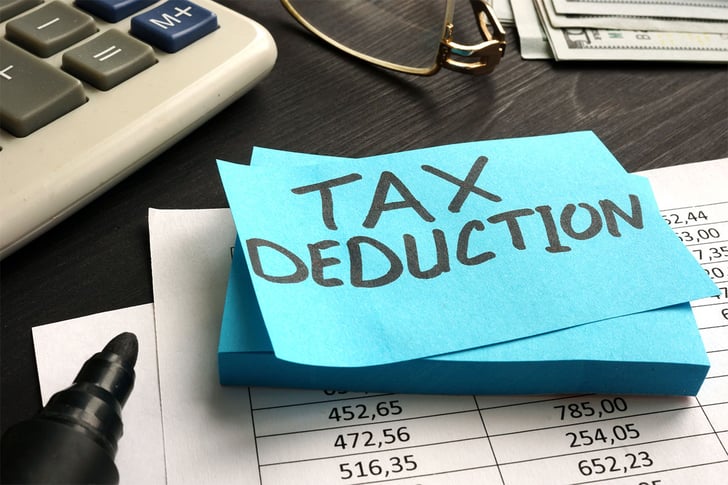Are IRA Investment Fees Tax Deductible?

Set up fees, annual fees, custodial and account maintenance fees, transaction fees, and commissions — all these fees required to manage your IRA can add up, chipping away at your retirement savings. The question is, can any of these be claimed when you file your income taxes?
In fact, some of these fees used to be tax-deductible, but is this true for the current tax year? This article will answer this question, as well as another frequently asked question "Are investment advisory fees tax-deductible?"
The Short Answer:
Currently, the majority of miscellaneous itemized deductions, such as IRA management fees, cannot be deducted on your personal tax return for 2023. Due to the Tax Cuts and Jobs Act (TCJA) that was enacted into law by Congress on December 22, 2017, other IRA management fees are not deductible. This provision, however, expires after tax year 2025, unless it is extended. The expenses paid out of pocket not able to be used as a tax deduction from the individual’s tax return include:
- Financial Advisor fees
- Investment advisory fees
- Investment management fees
- Fees for legal and tax advice related to your investments
- Trustee fees to manage your IRA and other investment accounts
- Safe deposit box fees
It's important to remember that individual circumstances vary. While IRA fees paid from the account are not taxable and reduce the balance in an individual’s retirement account, the overall tax advantages of IRAs remain significant for long-term investing.
Unfortunately, the deductibility of miscellaneous itemized deductions is on hiatus for tax years 2018 through 2025. However, some states may have different rules and some of these deductions may qualify.
Consulting with a tax professional for personalized advice based on your specific situation is always the best way to navigate the intricacies of tax deductions.
Should You Pay IRA Fees With Personal Funds or Retirement Funds?
How you should pay IRA fees is dependent upon the fee amount, your financial situation, and your saving strategy. The advantage to covering IRA custodial fees using your retirement account is that the amount paid from your IRA is not taxable to you since it’s considered an expense.
Alternatively, paying the fee using personal funding outside of your IRA may be better for you if you want to keep your IRA balance intact and not depleted by expenses. This allows the funds in the IRA to maximize the return on investment through accumulated tax-deferred growth.
The best approach is always to evaluate your individual circumstances. Consult with a financial advisor if you should pay your fees using IRA assets or out of pocket. They can help you make an informed decision based on your specific goals and tax situation.
Keep in mind, however, that although administrative fees can either be paid out of pocket or out of the IRA, expenses intrinsic to your IRA investment must be paid from your IRA.
Related Article Real Estate IRA Fees: How Much are you Paying?
Are Investment Interest Expenses for an IRA Tax Deductible?
No, investment interest expenses (form 4952) do not apply to IRAs and are not tax-deductible for these. While IRAs offer significant tax advantages, deducting interest paid on loans used to invest within an IRA is not one of them. Here's why:
- IRA contributions are already tax-deductible: You can deduct your IRA contributions from your taxable income, effectively lowering your tax bill upfront (Traditional IRA).
- IRA accounts grow tax-deferred: Earnings within an IRA, including interest, dividends, and capital gains, accumulate tax-deferred until you withdraw the money. Any expenses incurred by an investment just lower your gains in the IRA and cannot be used as a tax deduction.
While you can't deduct investment interest for an IRA, the tax-deferred growth potential and upfront deduction for contributions remain compelling benefits for long-term investing. Remember, it's always best to consult with a tax professional for personalized advice regarding your specific situation.
Real Estate IRA Fees
If you own a rental property in your IRA, the expenses associated with that property are not tax deductible. They cannot be claimed on your tax return. The income from the rental property goes back to the IRA and is untaxed, in other words tax-deferred. The expenses related to the property are paid from the untaxed earnings from investments within the IRA. The same is true for any other self-directed IRA investment.
For real estate investors who are used to paying taxes on profits from selling property (long-term or short-term capital gains) and income from investments (net taxable investment income), in an IRA these taxes don't apply since the earnings on an IRA grow tax-deferred. This means you can buy and sell investments, including real estate, without paying taxes on any profits until you withdraw the money later. The same is also true for capital losses.
IRAR Can Help With Low Fees
For over 28 years, IRAR has empowered investors to build their ideal retirement through smart, low-cost self-directed IRA accounts. We're your dedicated IRA custodian, here to guide you every step of the way and help you avoid any pitfalls that could jeopardize your tax-free savings. Lower fees mean less money out of your pocket and more money in your IRA for retirement. Contact us to learn more about our fees.







Comments (0)